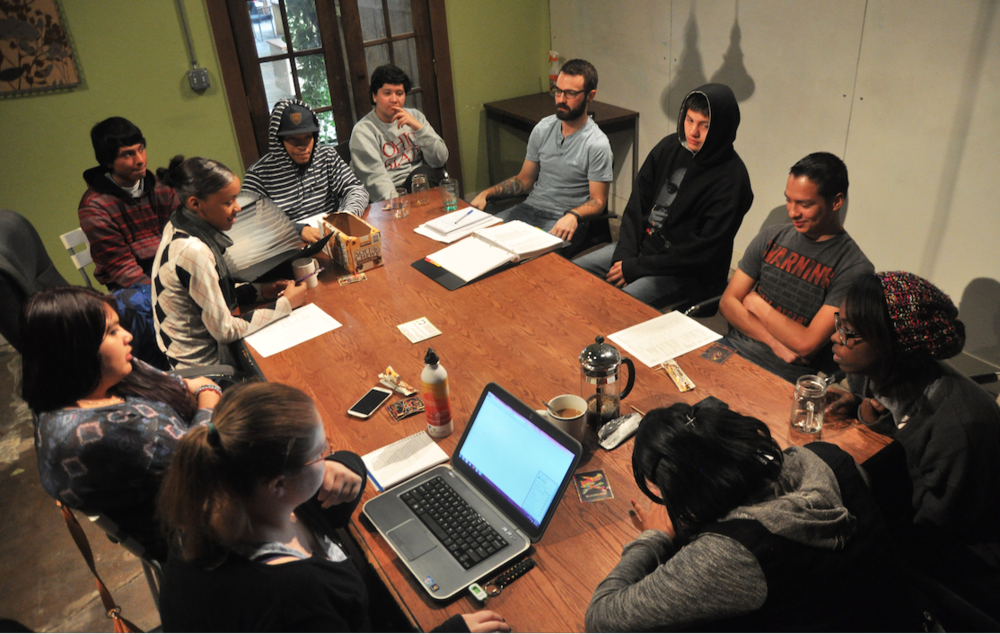A much needed oasis in a Denver food desert
By Nancy Layne | Photos by Stanley Sigalov
 The entrance to Green Spaces, where GreenLeaf meets.There is a desert in the heart of north Denver. A food desert to be more exact—an area without access to fresh produce. GreenLeaf hopes to change this.
The entrance to Green Spaces, where GreenLeaf meets.There is a desert in the heart of north Denver. A food desert to be more exact—an area without access to fresh produce. GreenLeaf hopes to change this.
GreenLeaf empowers communities through food justice by growing fresh produce while at the same time fostering youth leadership. Currently there are no grocery stores in north Denver with the exception of a Safeway at the edge of Five Points. Nationally, this is a common problem in urban areas. “Across the country there are 23.5 million people without access to healthy produce. This is seen a lot in low-income communities,” said Cody Meinhardt, executive director of GreenLeaf.
GreenLeaf, which was started in 2008 as a response to a lack of job opportunities in the area for people under 18, combats Denver’s high proportion of unemployed youth by putting them to work growing produce and bringing food justice to the area. The core belief of food justice is that every person, no matter what his or her background, should have access to healthy produce. Meinhardt sums up the GreenLeaf mission with a tagline the crew came up with a couple years ago: “You are what you eat, eat what you grow, grow your community.”
The first GreenLeaf pilot program started summer of 2009 with a 3,000-square-foot garden right in the heart of the Cole neighborhood. In spring of 2014 GreenLeaf relocated their growing operations to a 7,000-square-foot garden located at 25th and Arapahoe Streets, known as the Denver Housing Authority Sustainability Park. GreenLeaf also collaborates with Urban Farmers Collaborative, Granata Farms, and Produce Denver. Seeds are generously provided by Denver Urban Gardens.
The heart and soul of GreenLeaf are the hardworking high school crew members who arrive at 7:30 in the morning to tend to their crops—which include raspberries, garlic, squash, kale, and basil, just to name a few. Every Wednesday the staff and crew meet in the afternoon to discuss plans for GreenLeaf. These meetings are always overseen by Meinhardt, who has a lengthy history of championing for food justice in the north Denver community. During the winter months the crew decides on what crops to plant in the spring. During the summer months participants dedicate 20 hours a week to working on the farm, including two hours every Wednesday for planning and three hours every Saturday.
The farm has approximately 30 raised beds along with a modest orchard consisting of a couple of apple and peach trees. Dominique Harris, a senior, said, “GreenLeaf has given me awareness of things I didn’t know such as food justice. I didn’t know how to grow vegetables at first but with help I grew. My favorite thing is watching something grow from a little tiny seed to something big. The first thing I grew was melons.” Gustavo Linares, a sophomore at Venture Prep has been at GreenLeaf for three years. “The part I like best of working on the farm would be when we’re transplanting.” Transplanting is the moving of a plant from a small container to a bigger container to allow room for the expanding roots. This is a delicate process because the roots are so fragile.
 GreenLeaf crew members planning future projects.Every Saturday starting in mid-July through the first weekend in October, the youth run a farm stand where community members can come and purchase fresh produce. The farm stand gives the youth a chance to earn fair wages, and learn about nutrition and food justice while engaging their community. Torazia Adams, a senior, said, “I like the farm stand because we get to meet the community and get to know new people and give them food. I learn a lot from both harvesting and learning how to communicate.”
GreenLeaf crew members planning future projects.Every Saturday starting in mid-July through the first weekend in October, the youth run a farm stand where community members can come and purchase fresh produce. The farm stand gives the youth a chance to earn fair wages, and learn about nutrition and food justice while engaging their community. Torazia Adams, a senior, said, “I like the farm stand because we get to meet the community and get to know new people and give them food. I learn a lot from both harvesting and learning how to communicate.”
Crew members hail from Venture Prep High, North Denver School of Science and Technology, and other neighborhood high schools. New members are recruited through presentations given at local high schools and community groups, as well as by word of mouth. Crew members check potential candidates’ references and conduct the interviews; hence the youth decide who is let in the program and who would be a good fit. “Since our founding in 2008, we have worked with over 50 youth. Over 25 percent of those youth have stayed with GreenLeaf for at least one year. Many stay for their entire high school career,” said Meinhardt.
Currently there are nine teens and two graduate school interns who were former crew members at GreenLeaf. Crew members are encouraged in leadership roles in order to build their career skills long-term. Through working the farm stand, GreenLeaf participants learn math skills, interpersonal skills, and how to run a small business. GreenLeaf participates in Community Supported Agriculture, in which people or families can buy a share of the farm and get a bag of produce for 12 weeks for approximately $150. The youth crew members are also in charge of organizing the produce and keeping track of funds received.
GreenLeaf members engage actively with their community by going to different forums around the city to speak on food justice. They also canvass the neighborhood to get news of GreenLeaf out. GreenLeaf is starting a series of cooking workshops over the summer as different crops are harvested for the crew members to learn how to cook healthy, homegrown food. The youth crew plans to have a cookbook available for the public to buy this fall. There are also volunteer days throughout April and May when volunteers are encouraged to experience life on the GreenLeaf farm.
“I hope in the future we have a bigger garden space and more crew members,” said Adams. Kelly Ramos, another participant, added, “I’d like to see more farms and more crews to expand GreenLeaf.” GreenLeaf hopes to expand throughout the Denver Metro area with multiple growing sites in the near future. They are currently looking for vacant land that can be cultivated in the Denver area. ■
For volunteer and donation information please contact GreenLeaf at (720)-491-1453 or greenleafdenver.org
